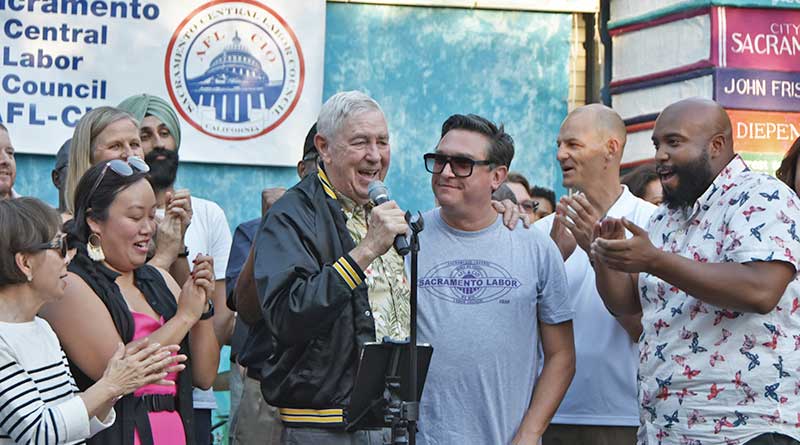Sacramento Labor mourns loss of an icon, Bill Camp
By Sheri Williams
Bill Camp, a leader and friend to many in the union world, passed away in September, leaving the family of Labor to mourn the loss of an icon.
“Bill Camp was a force of nature and a relentless warrior for working people,” said Fabrizio Sasso, the head of the Sacramento Central Labor Council. “But he was also a mentor and a friend and like it is for so many of us, his loss is devastating to me. But his legacy will live on in the work we do in his honor.”
Camp served as Executive Secretary of the Sacramento Central Labor Council for many years, leading the organization with a deep belief that every worker deserved dignity, fair wages and a voice on the job.
Beyond fighting for unions, Camp was a fighter for social justice. He understood that the battle for workers’ rights was inherently tied to the broader struggles for racial and economic equality and civil rights. Under his leadership, the Labor Council became a powerful force not just for union workers but for all who faced oppression and hardship, here and abroad.
“Bill was a tireless fighter for Labor,” said Kevin Ferreira, Executive Director Sacramento-Sierra’s Building & Construction Trades Council. “He was a mentor and ally, always on the front lines when we needed him.”
Camp’s tireless advocacy for working families was rooted in his profound compassion and his moral conviction that no one should be left behind. He marched in the streets, organized in union halls, and lobbied in the halls of power with the same passion and energy. His presence was a fixture at picket lines, community forums, and at every place where the fight for justice was being waged.
But more than his accomplishments, Camp will be remembered for the relationships he built. He was a mentor to countless young organizers and a friend to all who sought a better world. His legacy lives on in the movements he helped build, the lives he touched, and the future generations of labor leaders he inspired.
We will never forget Camp’s dedication, his unwavering courage, and his commitment to building a world where all workers can stand tall. His spirit will continue to guide the Sacramento labor movement for years to come.
Camp was the Executive Secretary of the Sacramento Central Labor Council, AFL-CIO, from December 1999 through December 2014. During this time, the Central Labor Council represented 171,000 union members in the Sacramento region.
According to an autobiography Camp wrote in 2022 for a Salute to Labor tribute, he was born and raised on a farm near Anderson, South Carolina—a cotton mill town in the red hills at the foot of the Smokey Mountains in the northwest corner of the state.
He made a key choice when he decided to enroll in a small Methodist college in Jackson in 1962, the beginning of a tough struggle for social justice in the states of the old confederacy. Camp joined the Civil Rights Movement there. He worked with students and their professors at a predominately college of African American students called Tougaloo College.
He then moved to Oregon and received his undergraduate degree in Sociology at the University of Oregon in 1966.
He returned to the South and enrolled in a PhD program in Sociology at Duke University in Durham, North Carolina. There he began to picket with workers who were organizing a union at the Cohn Cotton Mills chain.
“When I told them I had been helping to organize a union at a cotton mill, they said they wanted to organize a union at Duke,” Camp said.
Two weeks later the textile workers called and said they had signed up every worker of African American heritage at Duke. This was April 1968, the time that Martin Luther King was murdered.
Camp went to work, leafleting every dining hall on the campus urging the students to stop attending class until Duke agreed to bargain. Ultimately, 2/3’s of the students supported the strike by not attending class. The Duke workers got a union contract.
Camp moved back to the University of Oregon to work on a doctorate degree in education. After two years, he was bored and moved to Redding to work in the Lyndon Johnson poverty program.
After Ronald Reagan was elected U.S. President, Camp went to work as a volunteer in the McGovern campaign for President working to get rural northern Californians to vote for McGovern. Three of the six counties in California that McGovern carried in California were in the rural “cow” counties of Northern California where Camp volunteered.
After Jerry Brown’s successful election as Governor in 1974, Camp moved to Sacramento. Camp eventually went to work in 1975 for the newly created agency providing bargaining rights to agricultural workers, the Agricultural Labor Relations Board.
Camp worked at the California Agricultural Labor Relations Board from 1975 until 1985. Later, Camp went to work for the California State Senate Rules Committee from 1985 until 1991. There he worked as a liaison to unions throughout the state.
When the budgets of the state legislature were cut by 40% in 1991, Camp was laid off. He went to work for the California Federation of Labor, AFL-CIO focusing on support for the federation’s central labor councils and their local unions helping them engage their members in volunteer political activity. Camp worked as the Assistant COPE Director of the California Labor Federation, AFL-CIO, from 1991 through 1999.
In December 1999, he became the Executive Secretary (Chief Executive Officer) of the Sacramento Central Labor Council, AFL-CIO.
Through the rest of his life, Camp continued to travel to Cuba and Honduras building international solidarity with the unions and their leadership in those two countries.
In solidarity, we say: Rest in power, Brother Bill. Your fight lives on in us all.
